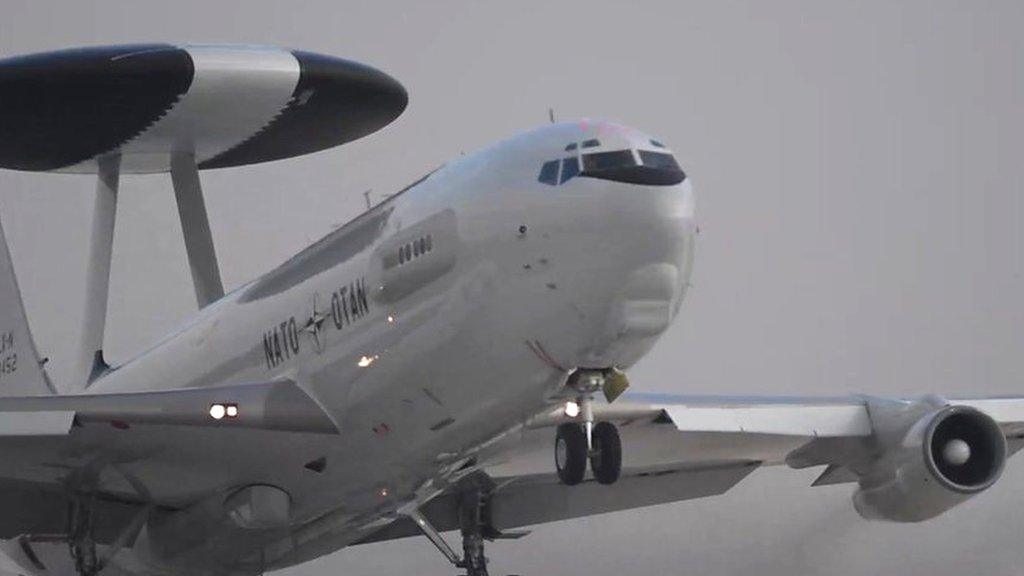Syria's Kurds say Trump US troop pullout harms anti-IS fight
- Published
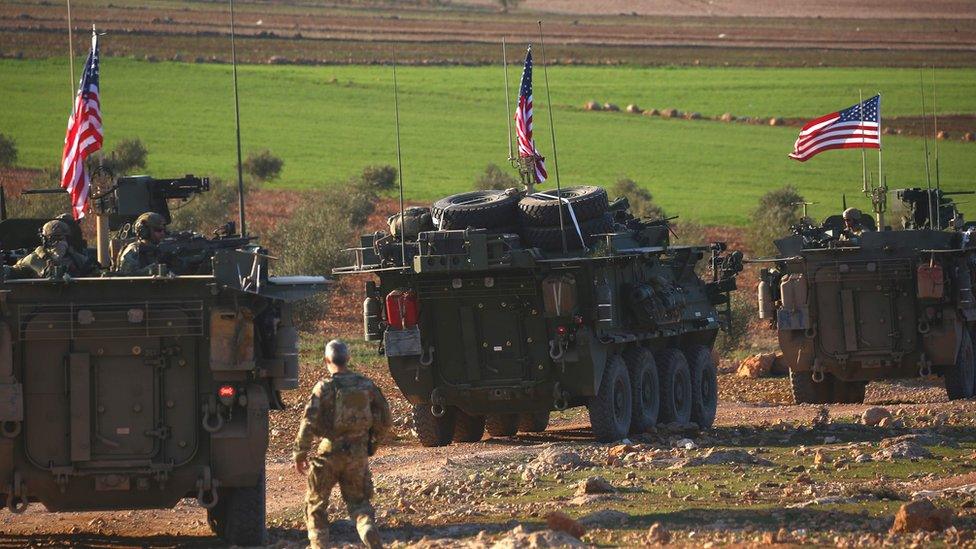
US troops have largely been stationed in the Kurdish region in northern Syria
A Kurdish-led alliance in Syria says President Donald Trump's surprise decision to withdraw US troops will allow the Islamic State (IS) group to recover.
A statement from the Syria Democratic Forces (SDF) warned of a military vacuum that would leave the alliance trapped between "hostile parties".
Mr Trump made the announcement on Wednesday, saying IS had been defeated.
However, major allies and some US politicians have disputed the claim.
France, which has been a key part of the US-led coalition against IS in Syria and Iraq, said its troops would remain in northern Syria for now because IS had not been wiped out.
The partnership with the SDF - an alliance of Syrian Kurdish and Arab fighters - is credited with playing a major role in the virtual elimination of IS after it overran large swathes of Syria four years ago.
About 2,000 US troops have largely been stationed in the Kurdish region in northern Syria. US officials quoted by Reuters news agency say that in addition, air attacks against IS will cease.
The SDF statement warned that the withdrawal would "negatively impact" the anti-IS campaign and allow the group "to revive itself again".
It said the US move would have "dangerous implications" for regional stability and "create a political and military vacuum... leaving its people between the claws of hostile parties".
Neighbouring Turkey has said it is poised to launch a military operation against the Kurdish YPG militia - the main fighting force in the SDF - which it regards as a terrorist group.
US support for the group has strained relations between Washington and Ankara.
What has the US announced?
The Pentagon said it was transitioning to the "next phase of the campaign" to eliminate IS but did not provide further details.
President Trump, who has long pledged to pull troops out of Syria, said on Twitter that it was time to bring them home after their "historic victories", external.
In a later tweet, he defended his decision and said it should not have come as a surprise.
Allow X content?
This article contains content provided by X. We ask for your permission before anything is loaded, as they may be using cookies and other technologies. You may want to read X’s cookie policy, external and privacy policy, external before accepting. To view this content choose ‘accept and continue’.

The White House would not give a timescale for the withdrawal but defence officials quoted by the New York Times said President Trump wanted it done within 30 days.
What other reaction has there been?
Republican Senator Lindsey Graham, who is one of Mr Trump's supporters and sits on the armed services committee, called the withdrawal decision a "huge Obama-like mistake", which would have "devastating consequences" both in Syria and beyond.
He said he feared it would mean ceding influence in the region to Russia and Iran.
Another Republican senator, Bob Corker, who is chair of the foreign relations committee, went further, saying it was "much worse" than Barack Obama's decision to pull US troops out of Iraq when he did.
"This is a transactional, political decision. It is not a decision based on facts on the ground," he told the BBC.
"It is going to harm us, it's going to harm the people who care about ridding the world of Isis (IS), it's harming our relations. It is a colossal mistake and it needs to be reversed."
Mr Trump's announcement came only a week after Brett McGurk, special presidential envoy for the global coalition to defeat IS, cautioned against a US withdrawal from Syria.
"Obviously, it would be reckless if we were just to say, well, the physical caliphate is defeated, so we can just leave now. I think anyone who's looked at a conflict like this would agree with that," he told reporters at the state department.
The UK government distanced itself from President Trump's assertion that IS had been defeated.
On board the eye in the sky watching Syria
"Much remains to be done and we must not lose sight of the threat they pose," a Foreign Office statement said.
France's Europe Minister Nathalie Loiseau said: "For now, of course we are staying in Syria because the fight against Islamic State is essential."
German Foreign Minister Heiko Maas said the US decision risked damaging the fight against IS.
Israel said it had been told the US had "other ways to have influence in the area" but it would "study the timeline [of the withdrawal], how it will be done and of course the implications for us".
Russian President Vladimir Putin, speaking at his annual news conference, welcomed the US decision but said he had so far seen no signs of a US pull-out.
"The US has been in Afghanistan for 17 years and they always say they are withdrawing," he cautioned.

What now for the Kurds?
Analysis by Jonathan Marcus, BBC diplomatic correspondent
Many will see President Trump's decision to withdraw US ground forces from north-eastern Syria as nothing less than a betrayal of the Kurds.
They have been Washington's most effective ally in the fight against IS. Now they are left as one spokesman for the largely Kurdish Syria Democratic Forces put it - "between the claws of hostile parties."
Turkey seems ready to push southwards, further into Syria to neutralise Kurdish fighters.
The Syrian regime has scores to settle. And IS, while significantly weakened, could still re-emerge from any security vacuum left by the US departure. The Kurds have secured a significant degree of autonomy in this part of Syria, but how long will this last?
The Kurds are divided between four countries - Syria, Turkey, Iraq and Iran - and riven by sectional disputes of their own. Their dreams of statehood seem as far away as ever.

What has Turkey said?
On Thursday, Turkish Defence Minister Hulusi Akar issued a stark warning to YPG fighters, saying they "will be buried in their ditches when the time comes".
On Monday, President Recep Tayyip Erdogan said the military operation against the YPG would start soon.
He added that he had discussed his plan with Mr Trump by telephone and that he had given a "positive response".
A spokesman for Kurdish authorities in north-eastern Syria, Aldar Xelil, told Ronahi TV that no-one was clear on details of the withdrawal "including US commanders here".
However, he called for continued protests against the looming Turkish operation.


What is the US military operation in Syria?
As well as having troops in the north-east, the US has also been part of an international coalition conducting air strikes against IS and other militants.
Although diminished, IS has not disappeared entirely. A recent US report said there were still as many as 14,000 IS militants in Syria, external and even more in neighbouring Iraq.
- Published19 December 2018
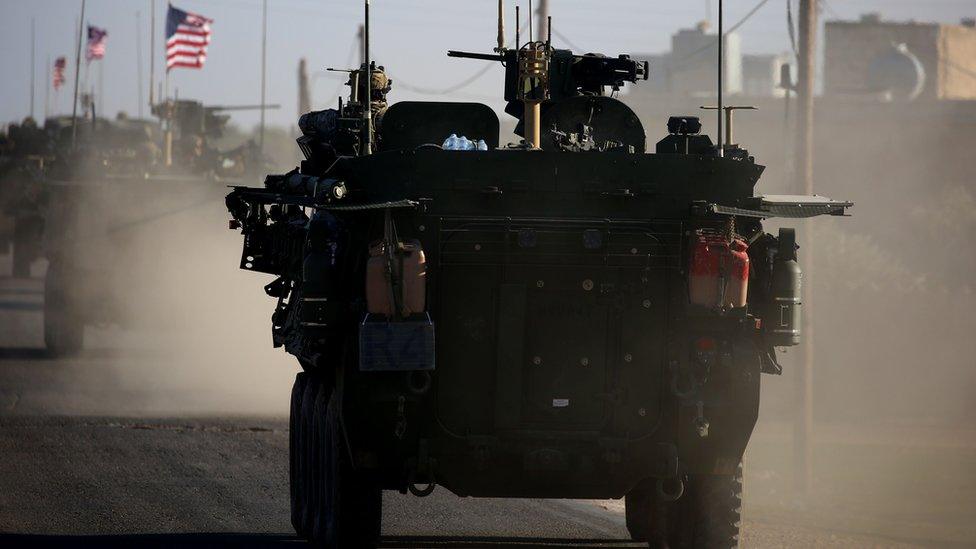
- Published23 March 2019
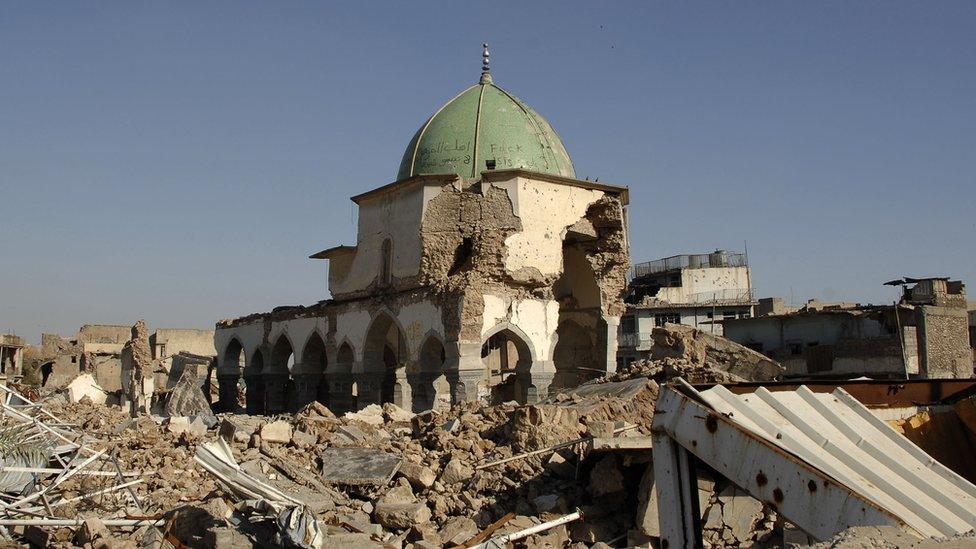
- Published4 April 2018
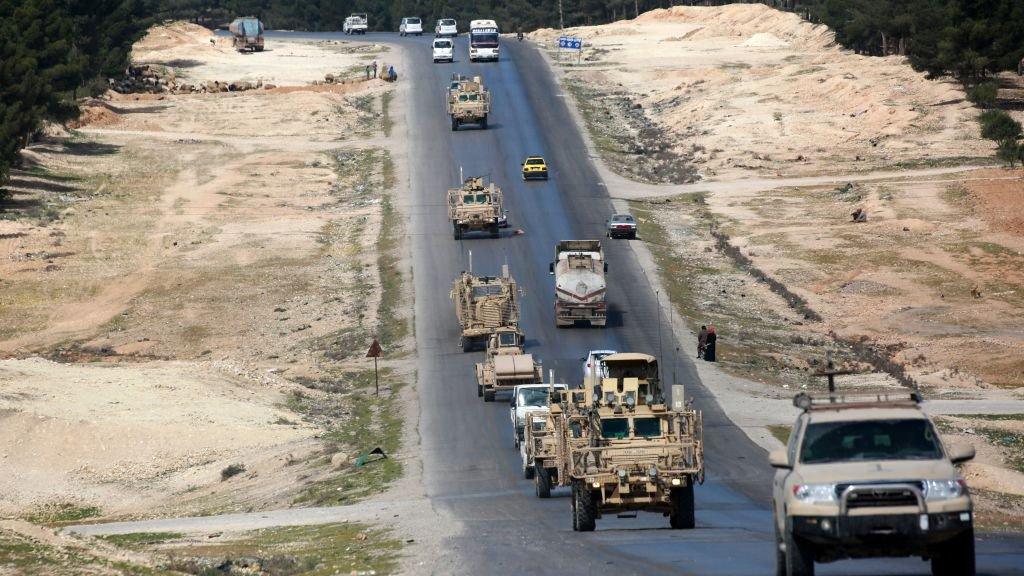
- Published18 December 2018
